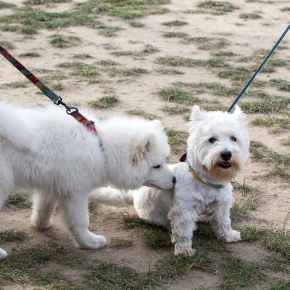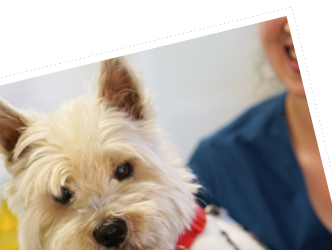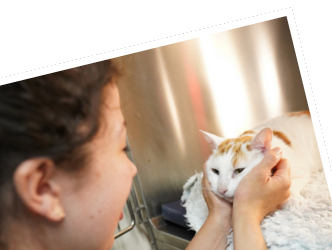
Sarah’s Socialisation Refresher Tips for Grown-Up Dogs
July 21, 2024
As our beloved dogs age, their behaviour and social skills can sometimes regress. Sometimes a previously well-socialised dog to develop new anxieties or react poorly in certain situations. Older dogs can often struggle in completely new enviroments. This is where refreshing your grown-up dog’s social skills can make a significant difference. In this article, Vet Sarah Aldridge explains how you can help your adult dog regain their social confidence.
Before we dive in, Sarah stresses that it’s important for Northamptonshire dog owners to know that some changes in behaviour can also be linked to pain and illness, especially in older dogs. A vet health check can help identify any underlying issues that might be causing or contributing to your dog’s behaviour changes. Book a check-up at Daventry Vets before starting a re-socialisation journey with your dog.
Why refresh your dog’s socialisation skills
Sarah shares that a well-socialised dog is generally calm, confident, and comfortable in various environments and situations. They can interact peacefully with other dogs and people, displaying natural behaviours like sniffing, playing, and friendly barking. However, if a dog’s social skills deteriorate, they might become fearful or reactive, exhibiting behaviours such as cowering and trying to get away, or loud barking, growling, and even aggression.
Why a dog’s socialisation skills deteriorate over time
- Lack of Regular Practice: Over time, without consistent reinforcement, a dog’s training can slip.
- Life Stage Changes: Older dogs may develop physical issues like stiff joints, making them less eager for play and more prone to defensive behaviours – book a check-up.
- Traumatic Experiences: Negative experiences, such as being attacked by another dog, can lead to increased anxiety and fearfulness.
Try Sarah’s refresher socialisation tips for adult dogs
Before you begin, Sarah says it’s wise to remember that refreshing your dog’s socialisation skills requires patience, a structured approach, and positive reinforcement. Use their favourite treats to reward them, do short sessions and play with them afterwards. Here are some effective strategies:
1. Refresh Basic Commands & Training: Before tackling socialisation, ensure your dog’s basic training is solid. They should respond well to commands like sit, down, stay, and walk nicely on the lead.
2. Experience Different Environments: Gradually reintroduce your dog to various environments. Start with calm, familiar places like a friend’s house or your local Northamptonshire park. Reward positive behaviour with treats and praise. Once your dog is comfortable, slowly introduce busier locations like town centres and dog-friendly shops. Garden centres can be an ideal outing for your dog to practice their socialisation skills.
3. Meet Other Dogs: If your dog used to be sociable but has started to regress, this strategy is crucial to re-master to ensure happy and safe adventures together. Introduce your dog to other dogs in a controlled setting. Begin with parallel walks, then progress to off-leash interactions and play if they want to in secure areas. Always monitor interactions closely to ensure they are positive. Sarah advises choosing a controlled environment away from home, as dogs are naturally territorial over their own space.
4. Join Dog Training Classes: Enrolling your dog in training classes can be beneficial for the both of you. These classes provide structured environments for social interaction and learning new commands, reinforcing positive behaviours. We recommend trainers who only use positive reinforcement. The institute of modern dog trainers and The association of pet dog trainers both use positive reinforcement and have find a trainer functions on their websites.
We hope you found Sarah’s adult dog socialisation refresher tips easy to follow. If you have any queries, we’re always here to help. If you have concerns about your dog’s change in behaviour, book a health check with one of our vets before working through the guide, to find out if pain or an underlying illness could be a contributing factor.
And remember, patience, structure, and positive reinforcement are key. If you encounter challenges, don’t hesitate to consult a professional trainer for guidance.



